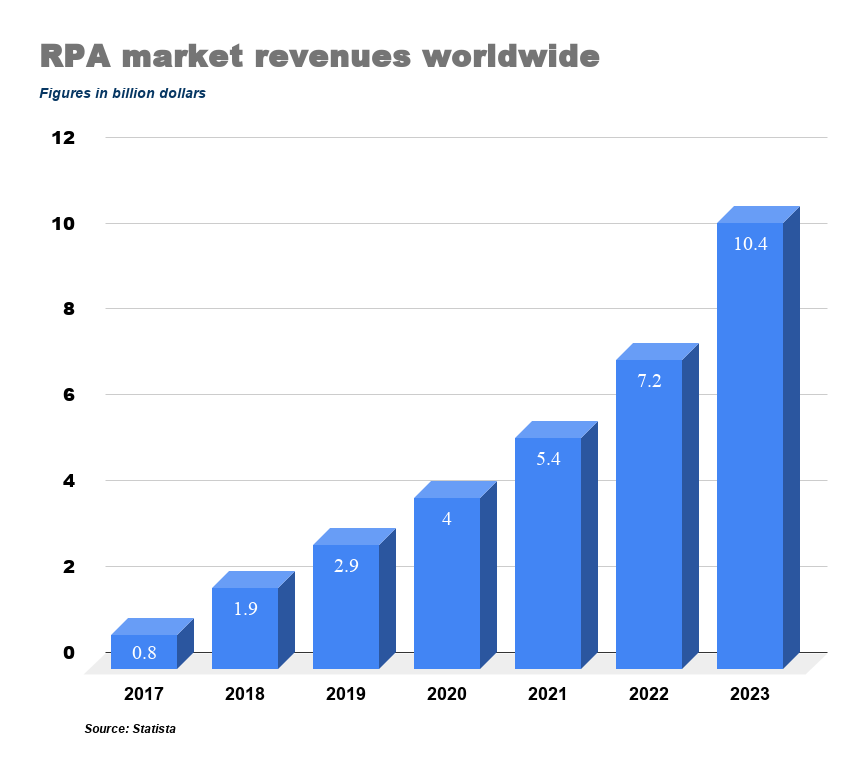Adoption of software robots by enterprises gains traction to keep business continuity
The role of technology and its integration within the organisations are evolving at a faster pace and entities are deploying software robots or bots to do the business processes much faster in a bid to keep business continuity due to Covid-19.
Robotic Process Automation (RPA), the use of software with artificial intelligence (AI) tools to automate high-volume and repetitive manual tasks in the enterprise sector that previously required human input, is one of the biggest disruptions happening at the workplace.
Milan Sheth, Executive Vice-President for India, Middle East and Africa at Silicon Valley-based Automation Anywhere, told TechRadar Middle East, that there are three sectors in the Middle East where there is a tremendous uptake - government-owned enterprises, financial services, energy and utility sectors but healthcare and life sciences are seeing an increase due to Covid-19.
However, retail and travel-related businesses have slowed down due to the pandemic.
Automation Anywhere is one of the three biggest RPA companies in the world, alongside UiPath and Blue Prism.
RPA helps enterprises raise their productivity, compliance and process efficiency levels; Sheth said and added that Automation Anywhere will be the largest digital employer in the world [with 3m bots] by the middle of next year from the current 2.1m.
“We have built products to automate the workforce for a modern enterprise. Between the UAE and Saudi Arabia, there will be more and more demand for expanding the digital workforce. It will create more jobs locally and instead of offshoring, you are bringing it back using technology and deliver productivity,” he said.

MEA spending to increase four-fold
Manish Ranjan, Program Manager for Software and Cloud at IDC, said, that spending on RPA solutions in the Middle East and Africa region will represent an almost four-fold increase and a strong annual growth rate of 33% for a five year forecast period of 2019 to 2024.
He added that spending on RPA in the UAE is expected to grow 44.8% year on year in 2020 to reach over $11 million.
According to a latest IDC CIO survey, about 36% of CIOs said they are going to spend more on RPA in 2020 compared to their pre-Covid-19 plans.
During the current pandemic, Ranjan said that one of the key business priorities for both public and private sector is to ensure business continuity by providing better services, improved customer experience, enhanced collaboration across departments and improved business process automation. RPA can contribute to each of these priorities, by enhancing efficiency and agility across the organisation, he said.
According to a survey conducted by Automation Anywhere in over 20 countries across India, the Middle East and emerging markets in Africa, 80% of business owners plan to invest in digital technologies to build resiliency in their future business plans while 70% of executives expect 50% of their current work to move digital as a response to the current situation and more than 50% expect to invest in intelligent automation in this financial year to power their digital transformation mandate.
Intelligent Process Automation or intelligent automation is an upgrade of RPA and provides not only a rule-based but also judgement-based automation which is based on artificial intelligence (AI) and machine learning (ML).
RPA is rule-based task automation where the rules are defined by the user and can read structured data very well and brings speed while cognitive brings the ability to read unstructured data.

Big jump in digital transformation

“Now, digital transformation is a CEO agenda and it is no longer a CIO agenda. The best businesses that had a digital way of operating had continued their operations even in bad times. Everybody has realised that it is not just needed for business continuity but also to create a better customer experience,” Sheth said.
Ranjan said that as deployments of AI and cognitive solutions based on machine learning increase, demand for intelligent solutions capable of self-learning and self-healing will rise from organisations looking to enable true digital transformation.
There is increasing adoption of RPA globally, he said and added that the Middle East and Africa (MEA) region is no different.
“Process-intensive departments such as finance and accounting, customer support, quality and process improvement, HR, and sales are the key business functions where RPA can be most effective. For the government sector, RPA is of paramount importance for customer/citizen care, and quality and process improvement,” he said.
Similarly, within healthcare, he said that RPA is being used to manage the influx of patient appointments, managing healthcare workflow and healthcare cycle, streamlining claim processes, speeding up the processing of various information and data entry etc.
The only thing that is unique in the Gulf Cooperation Council (GCC) countries when compared to other regions, Sheth said is that governments are extremely citizen-oriented, particularly the UAE and Saudi Arabia. So, a lot of “citizen services” will also get digitalised.
“We have seen a big jump in digital transformation and with that, RPA and cognitive is going to take off in a big way. Cognitive automation is to handle unstructured data such as those residing in papers, emails and PDFs. Because people are not physically present in the office, digital documents are validated straight away on to the system. This has caught on in the Middle East,” he said.
Building digital workers
Because of Covid-19, Sheth said that RPA is seen not as a replacement of human workers but as resiliency and most of the big banks’ operations did not suffer during the pandemic because they had bots as backups.
Moreover, he said that RPA will evolve and intelligent process automation will eventually lead to digital workers.
By 2023 or 2024, Sheth said that they will be building digital workers doing end-to-end work for a company or a function and that is the end goal.
The ability to integrate legacy systems is the key driver for RPA projects and the biggest adopters are banks, insurance companies, telcos, utility and energy companies.
However, Sheth said that they deliberately avoided working with telcos because it does not serve its strategy.
“When you are tying up with someone, it should solve a problem. The problem in the Middle East today is to solve unstructured data as there are documents in multiple languages and that problem cannot be fixed in the cloud. The problems on the ground have to be solved first and once it is fully automated, then it can be put on to the cloud and that is where telco partnerships will come into play,” he said.
Automation Anywhere has tied up with AWS data centre in Bahrain, so that businesses can run bots from the cloud rather than from on-premise.
Globally, it has tied up with AWS and Microsoft for data hosting.
Compared to other parts of the world, Sheth said that the Middle East is very transaction oriented, such as trading transactions and consumer transactions.
“It is a consumer industry rather than a B2B industry. Financial services, retail, travel and hospitality have a high number of transactions, high number of consumer touchpoints and we are now focusing on that,” he said.
The Softbank-backed firm opened its regional headquarters in Dubai last year has plans to open offices in Abu Dhabi and Riyadh but Sheth said that Covid-19 has changed the timelines.
“Whenever an economic activity is back to normal, we will open offices,” he said.
Globally, they have more than 4,000 business groups as clients and 1,900 partners.
In the GCC, excluding Qatar, Automation Anywhere has close to 200 business groups as clients and out of that, more than 100 are from the UAE.
By 2021, Sheth expects to have 300 business groups, with 40% clients each from Saudi Arabia and the UAE and the rest 20% from other GCC countries.
Saudi Arabia and the UAE are the biggest markets for the company.
from Future - All the latest news


No comments